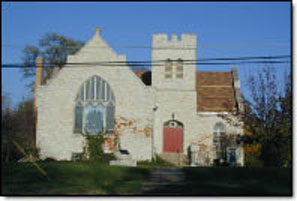
It was the first week of January, 1989, and snow settled heavily across the rural Illinois fields. Christmas break had just ended, and children trudged apprehensively at first, clothed in hats, scarves, mittens, and snowsuits onto late-model buses. The sun shone brightly in the eastern sky as our bus began its routine journey. Ours was the last stop, and as the bus loomed closer, we could see the vastness of the church before us through fogged windows. The cross, with great purpose perched upon its roof, and the manger scene to the right of the wooden doors showed gloriously the symbolism of our faith.
We poured off the bus, chattering noisily, the sound of mufflers harsh behind us. Our previous hesitation at last lost, as we rushed quickly across the pavement, snow crushing beneath the heels of our boots. We gathered in a giant circle near the merry-go-round on our playground, and we were extremely boisterous. All the kids began bragging about having gone to visit their relatives in another state and how many great presents they had received. Most talked of getting new clothes, jewelry, shoes, or a bike.
I remember listening to Katrina explain how wonderful her new bike was, “and it’s pink, and it has a horn, and purple and pink ribbons hang down from the handle bars…” She looked annoyed when Amber interrupted her to ask me what I had received for Christmas.
I replied, “I got a My Little Pony Sapphire Shores figurine and a few books.” I can still remember their startled glares gazing ever so intently in my direction, waiting for me to provide the remainder of the list. But it never came. The students soon began asking, “What else did you get? Were you bad?”
I do not know why, but I remember having concentrated on Katrina. She stood there, an expression of bewilderment painted across her face. I remember her asking me, in an almost cruel manner, “Is that all you got?” I was reluctant to speak, and her impatience and irritation with my failure to provide an adequate answer was followed by another question. “Is that all your parents could afford?” she asked, sarcasm dripping from each word. I never replied. It was not really a question anyway.
My eyes began tearing, and not wanting anyone to see me cry, I left the circle and walked to the monkey bars on the other side of playground. I do not believe that Katrina felt badly for having thought or said what she did. To be honest, I believe she felt that our school should be comprised of the wealthy, and that those students coming from lower-income families should attend public schooling.
The school I attended was St. Rose, a Catholic school in rural Illinois. It is important to note, that this school was located in a small town with modestly lower-middle class residents. For this reason, the townsfolk understood that those families sending their children through private schooling were those who did not quite fit the norm. Instead, the vast majority of these families, although Catholic, came from upper-middle and lower-upper class positions.
My family was quite different. Having been poor, my mother and father received tuition breaks based on my mother’s unpaid employment at the school and church. She would assist the school secretary as well as nuns by volunteering at Kuzma Care Cottage, a food bank provided by our church. Although I understood the difference in my family’s income as compared to the other students’ families in my grade, I never felt especially different from any other student until this incident.
I suppose this instance made concrete the socio-economic differences amongst us. Many more situations resembling this occurred throughout the future of my private schooling. The children had always known there were differences amongst us, but I can honestly say that this was the first occurrence that created a visible barrier amongst us. We were children, and the material possessions that we wanted, we thought we should have. The difference was their families could provide those things and mine could not.
For quite sometime my awareness of the structure of class left me with a bitter contempt toward members of upper-class positions. I thought of the struggles of lower and middle-class individuals, and I perceived the ease with which the upper-class skipped through life. I understand now, that I was wrong in my thinking. Although I am sure that certain positions increase the likelihood of privilege, I also understand that I myself am privileged. I have an opportunity to rise above my impoverished past, with a perspective most might even envy. I have seen the blackness of poverty, and I have envisioned a future of wealth.